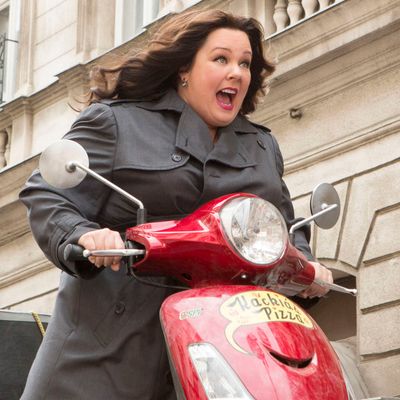
Gazing in awe at Melissa McCarthy on the posters for Spy, I thought back to the ‘90s, when Hugh Grant made his name in Four Weddings and a Funeral as an adorably abashed romantic lead and a showbiz paper reported that the question on the lips of every studio executive was, Can Hugh Grant hold a gun? Today the question is even more urgent, given that a much higher percentage of Hollywood’s income is from markets (especially Asian) that want more weaponry, more explosions, and more recognizable stars. So the last person — in light of Hollywood’s prejudices vis-à-vis women and their body sizes — you’d imagine on a poster holding a big gun is now headlining a potentially lucrative action-comedy “franchise.” I’d like to say the film is a feminist breakthrough, but this is all about box office. And it’s going to be boffo.
The central joke of Spy is that this heavy female insult comedian is playing the role of a James Bond undercover secret agent. Well, she is and she isn’t. Her mousy CIA analyst Susan Cooper steps into the breach when the covers of other agents are blown and she’s the only one the villains can’t identify on sight. But there’s a female-disempowerment backstory, too. Ten years earlier, Susan had the potential to be a star agent but was seduced by the 007-like smoothie (Jude Law) whom she plainly adored into becoming his personal analyst — the person who, like Chloe on 24, directs him through an earpiece when he’s on assignment. She knew it was unlikely he’d be interested in wooing a woman like her, but a lonely girl can dream, right? And she still has to fight the perception of herself as insignificant. Her superiors give her ostentatiously frumpy disguises and conceal her gizmo-weapons in boxes of hemorrhoid pads. She’s ordered to observe and not to act. So we wait for McCarthy to drop the mousiness and become the mouthy, foulmouthed motormouth that made her famous.
Action-comedies are generally mixed bags, lurching between slapstick and violence, and Spy is unusually mixed. A page of my notebook reads, “That’s funny … Ugh …. That’s really funny … That doesn’t work … They should have cut that, it’s embarrassing …” The beginning is the worst part because McCarthy doesn’t do meekness well, and she’s required to stammer stupidly while gazing into Law’s baby blues. In several scenes, she’s paired with another overlooked female analyst played by Miranda Hart, a tall, flamboyantly gawky British comedian beloved on the other side of the pond. I’m sure Spy will win her a new audience, but the way the movie hard-sells her funniness made me cringe, and she and McCarthy never really find a rhythm. As a macho braggart agent who turns out to be a stumblebum, Jason Statham is even more off-key. A drolly understated presence in his own action movies — his Cockney simmer is a thing of beauty — he signals so broadly that he’s doing comedy, he kills the jokes.
Things improve exponentially with the arrival of Rose Byrne as the villainess, Rayna, daughter and heir of a recently deceased Eastern-European arms kingpin. Byrne seems to be able to do anything, and in comedy terms, her Rayna is a career best. The key is breezy understatement. Her Rayna is the ultimate mean girl, but her put-downs are so light and insouciant that she just seems to exhale them, as if she knows she has more beauty, style, and smarts than anyone alive and hardly needs to force the issue. The other performer who steals every scene from McCarthy is British TV’s best-kept secret, Peter Serafinowicz, as an Italian agent who takes every opportunity to grab Susan’s ass and vows to make wild love to her. Serafinowicz’s diction is in the strange, overdeliberate style of Christopher Walken; he makes even his bad lines hit you like wobbly sinkerballs. (It’s worth investing in a PAL/Region 2 DVD player to savor The Peter Serafinowicz Show.)
Spy reunites McCarthy with Bridesmaids and The Heat director Paul Feig, who once moved the boundary posts on TV with Freaks and Geeks but appears to have settled into a conventional Hollywood groove. Apart from a shockingly gory fight scene in a restaurant kitchen between McCarthy and a female assassin, he shows no gift for action; and much of the editing in the comedy scenes is pushy, as if the editor didn’t trust the laughs to come on their own. But the movie jumps to another level once McCarthy is McCarthy again — i.e., the pop-top fount of abuse. (It makes no psychological sense for the character, but if it’s funny, who cares?) And Feig keeps throwing so much stuff at you — gross-out gags, chases, brutal violence, not to mention actors working their heads off — that he finally wears down your resistance. In the end, I admired him for keeping this ramshackle construction together, casting performers I adore, and proving that Melissa McCarthy can, indeed, hold a gun. A mixed victory. A definitively mixed review.


